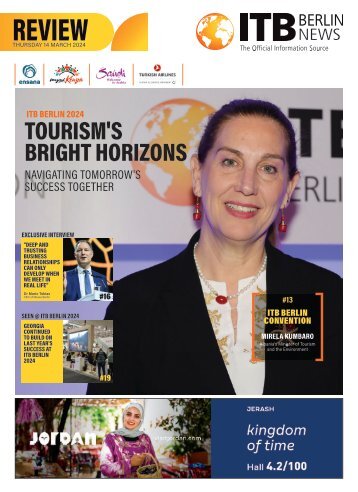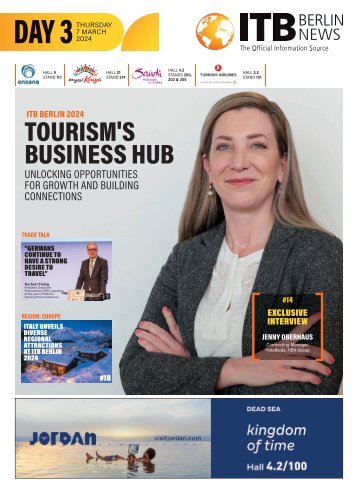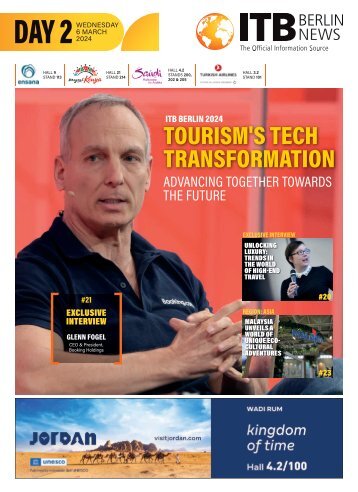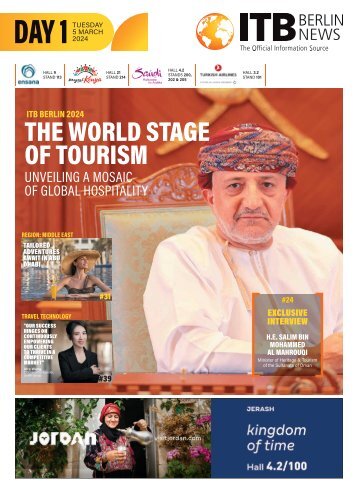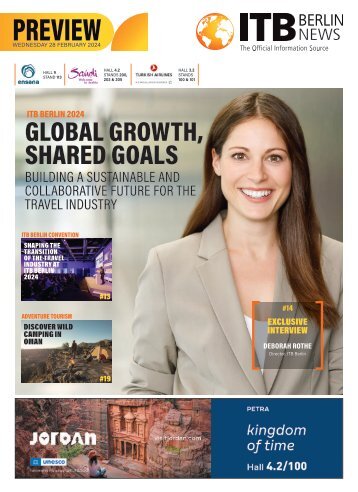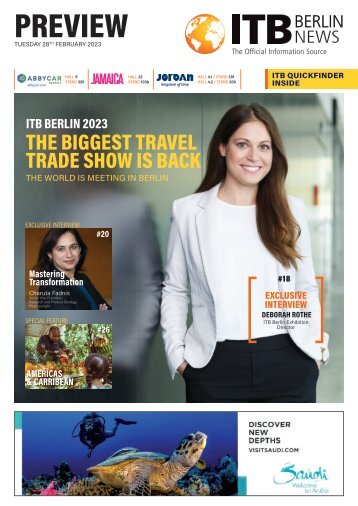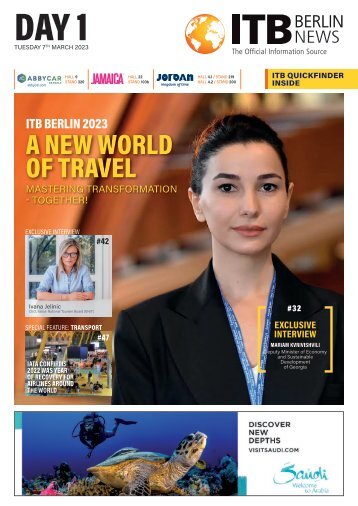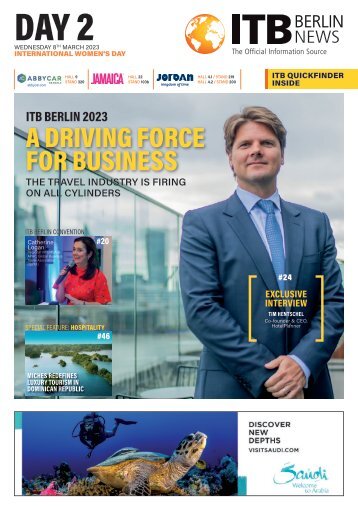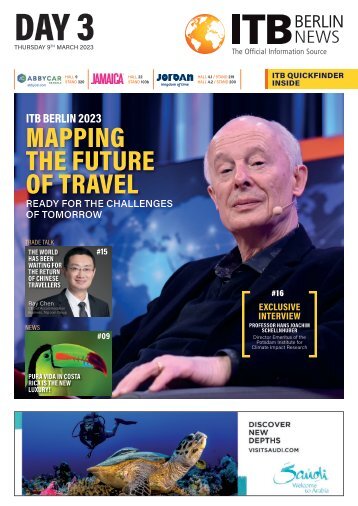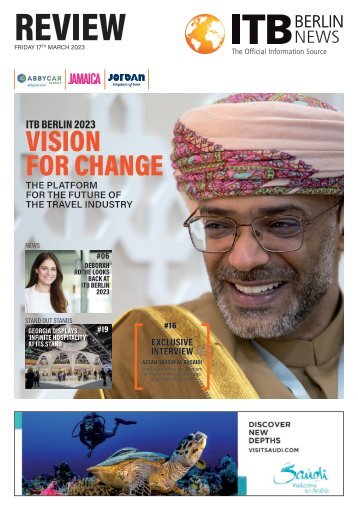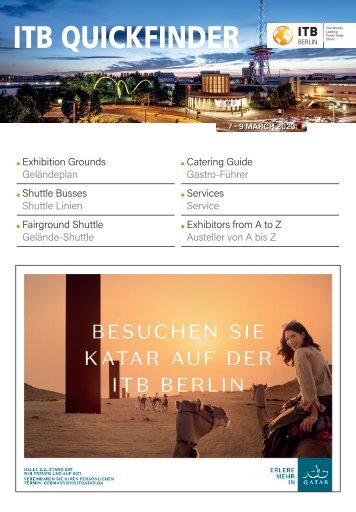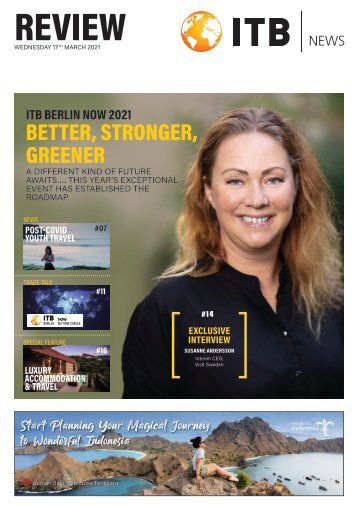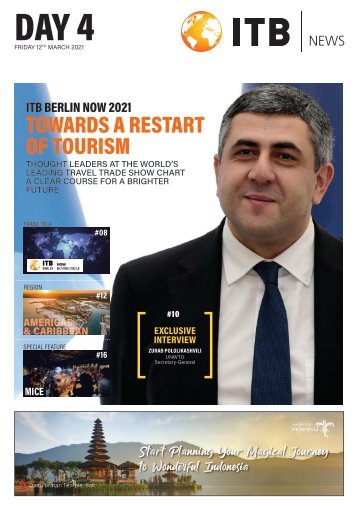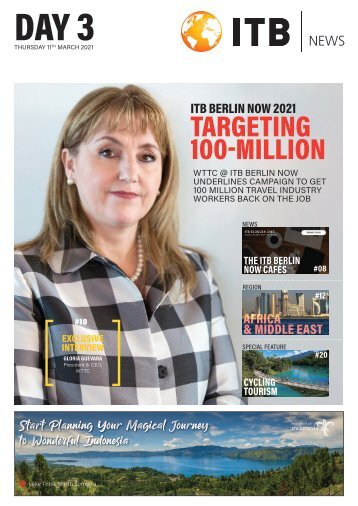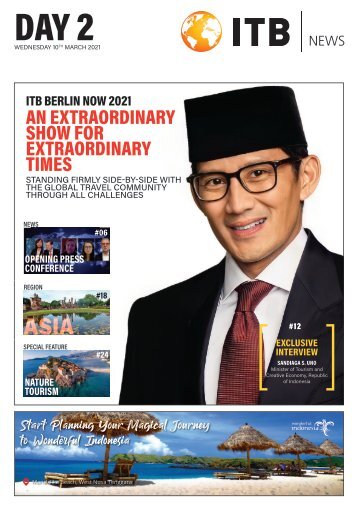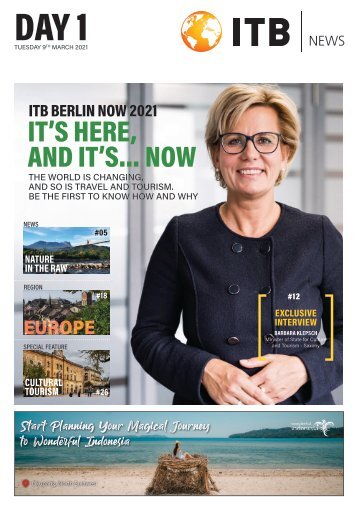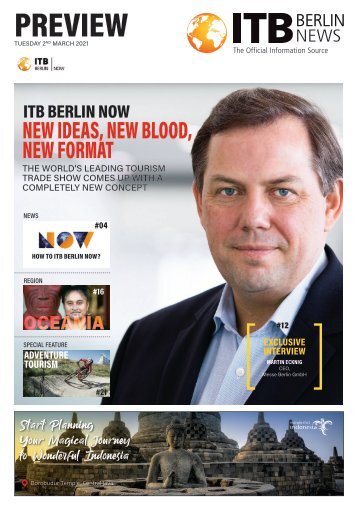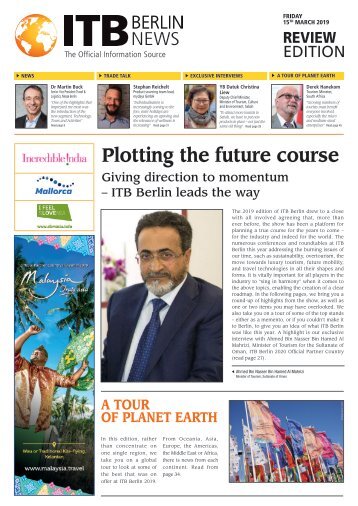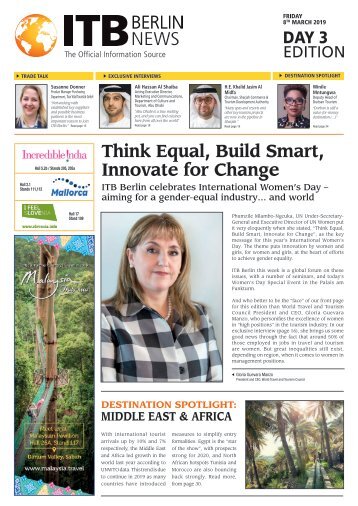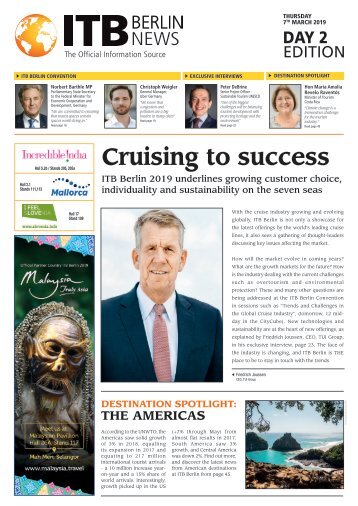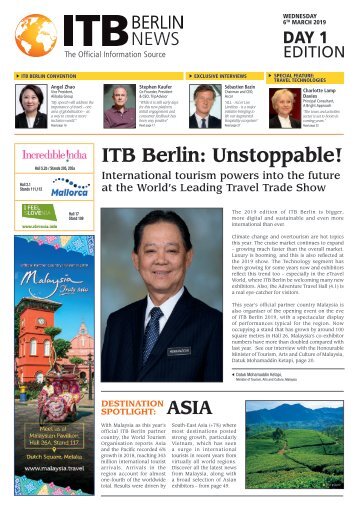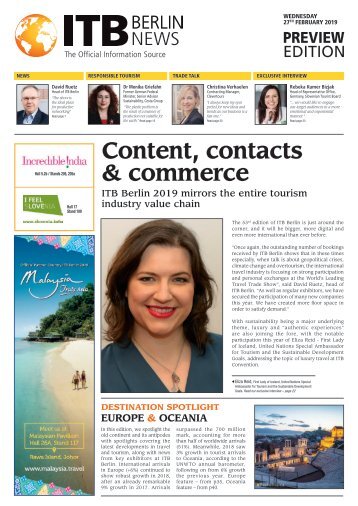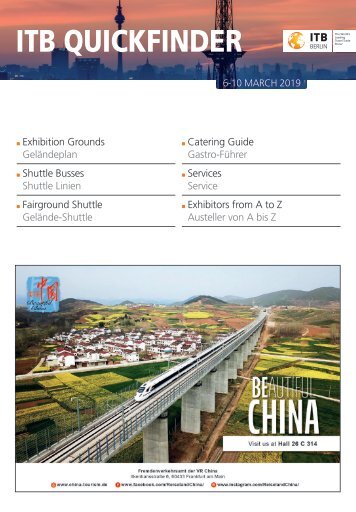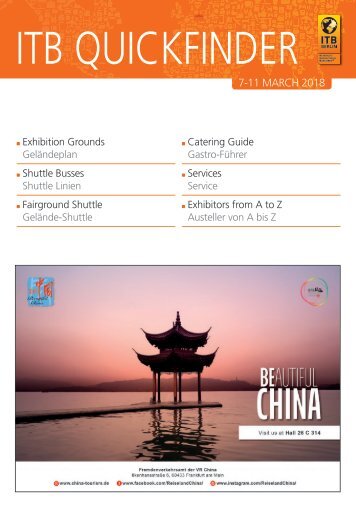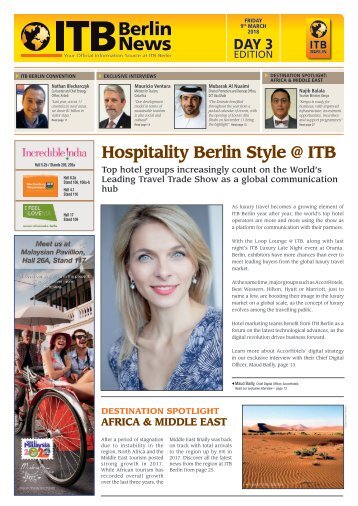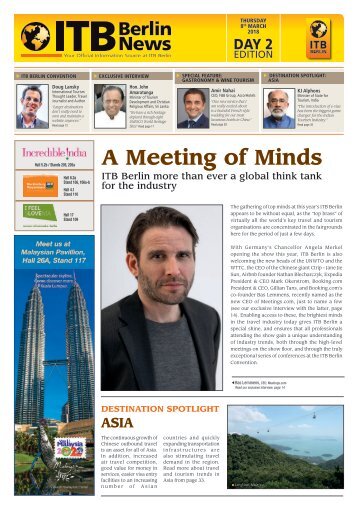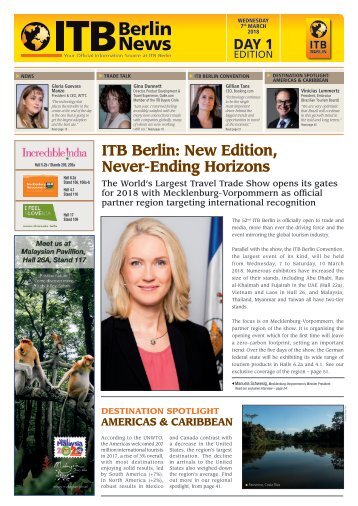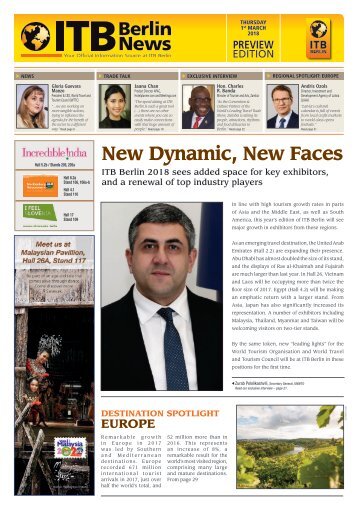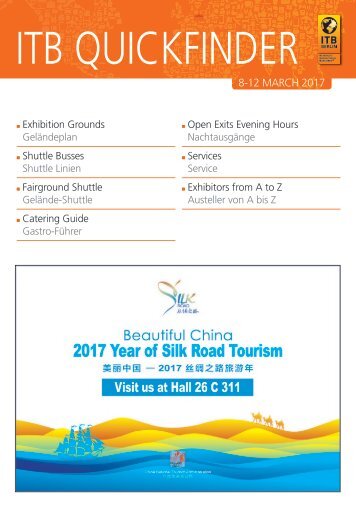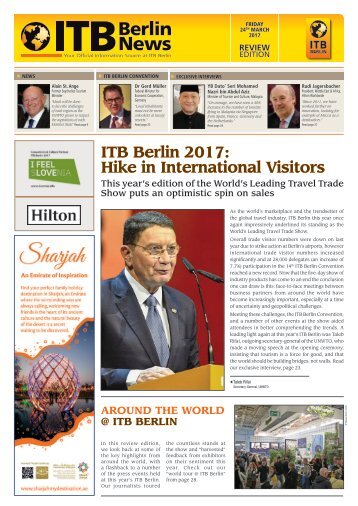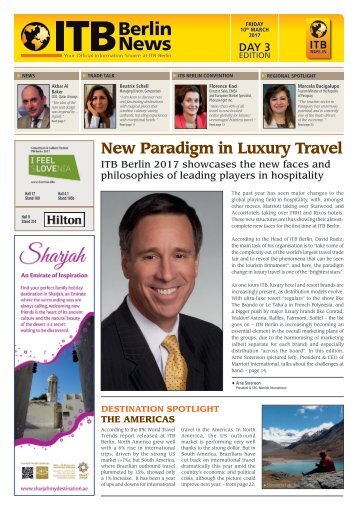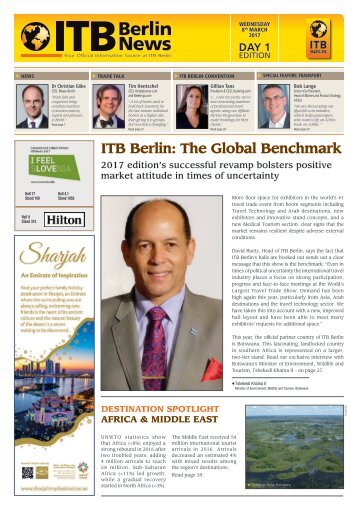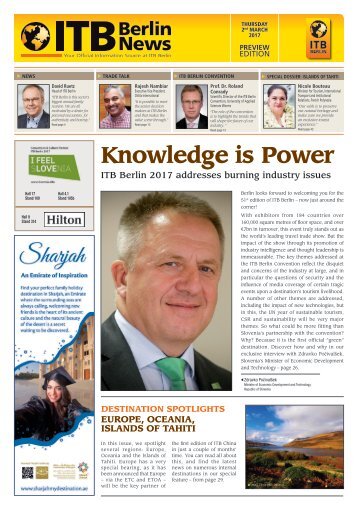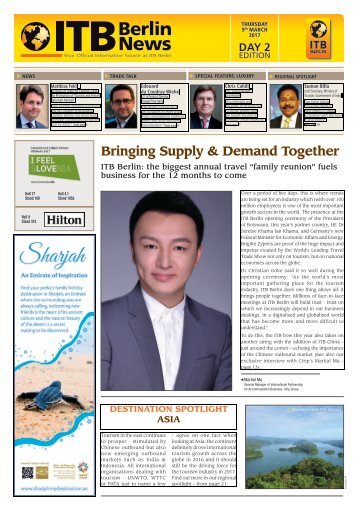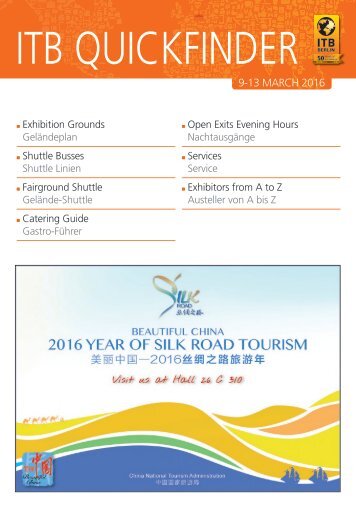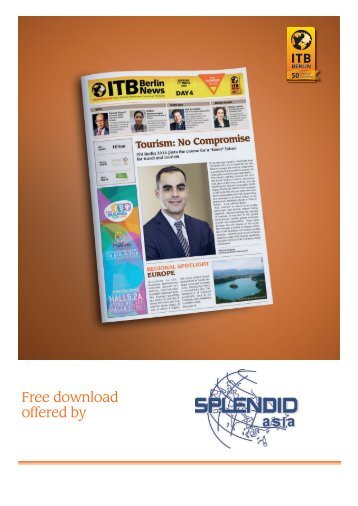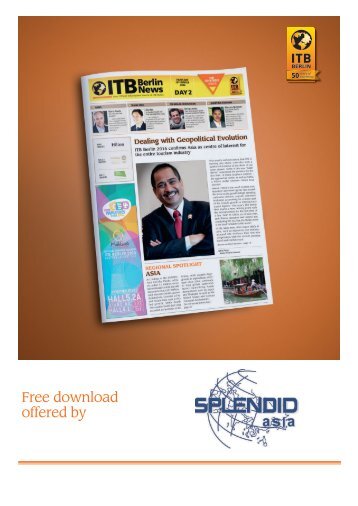
ITB Berlin News - Day 1
- Text
- Berlin
- Tourism
- Global
- Trends
- Countries
- Americas
- Marketing
- Destinations
- Mobile
- Www.cleverdis.com
32 SPECIAL FEATURE
32 SPECIAL FEATURE TECHNOLOGIES The Changing Face of New angles on how social media works in fostering ITB Berlin kicked off this year with an event on the topical subject of omni-channel marketing, featuring high-ranking participants. Facebook’s Global Head of Travel Strategy, Lee McCabe was present at the summit to talk about the prospects for social media securing new customers. As the Global Head of Vertical Strategy for Travel at Facebook, McCabe considers himself an “ambassador for the Travel industry and for Travel marketers”. McCabe hails from a marketing background with Expedia, Telstra Bigpond and Warner Home Video, and is now responsible for “how Facebook thinks about and works with travel marketers as well as identifying and developing strategies and initiatives focused on transforming businesses in travel industry categories across the world”. We asked him why he thought he was selected for this pivotal role in what has become a truly pivotal information platform… Lee McCabe Global Head of Travel Strategy, Facebook … GROWING YOUR BUSINESS IN THIS PREDOMINANTLY DIGITAL ENVIRONMENT ISN’T A JOB FOR JUST A SMALL TEAM DEDICATED EXCLUSIVELY TO SOCIAL MARKETING… Having spent my career in this industry, I understand its unique challenges and work closely with many teams at Facebook to ensure we’re best serving businesses and the 1.23B people who use Facebook. By understanding the nuances of this industry— and in close collaboration with Facebook’s Product teams—we continually build and improve products that offer industry-specific solutions for our clients. I also work closely with our Sales and Marketing teams as they partner with marketers working to achieve any number of goals related to brandand direct responserelated initiatives. Given that people are constantly connected and that we have more ways of reaching people, this is a very exciting time for travel. Can you offer some marketing recommendations regarding how to use Facebook if a business is just getting started with social marketing? Initially, I’d urge hotel marketers to focus their efforts on reaching people where they are spending their time. It’s easy to allocate resources similarly year after year. But because people are now “always-on,” businesses would really benefit from a shift in resources that falls more in line with how and where people are spending their time. Second, growing your business in this predominantly digital environment isn’t a job for just a small team dedicated exclusively to social marketing. Large, digital platforms like Facebook often get coined as “social” marketing, but social marketing is really just marketing. Facebook is a highly efficient and highly effective mass media tool, so it’s strategically advantageous to acknowledge—in theory and in practice—that platforms like Facebook should be integral components of a business’ overall marketing strategy. Lastly, I’d suggest utilizing Facebook’s creative canvas in News Feed to drive inspiration. Curate highquality content that reflects your brand, and put people at the heart of your story. Businesses can really own this process and leverage the power of people on Facebook to influence consumer behavior. What advice or techniques can you offer those in travel regarding how to use Facebook in terms of executing ad buys and interacting with users, for example? Invest. Put senior marketers on the case. Facebook is a massive platform. With 1.23B people using Facebook worldwide, marketers can scale their businesses with sophisticated targeting based on real, rich profiles. All of your customers are online and on Facebook, so the return on the right investment can be huge when reaching people where they are spending their time—and on their many devices. MGM, for example, saw 15X ROAS using Facebook Exchange, which enables businesses to deliver ads based on user intent data they own, allowing for efficient direct response marketing. As more people shop and share online, marketers’ investments and efforts should reflect this behavior. Can you give an example of a brand that has successfully used Facebook ads? At the end of the day, hotels on Facebook can do three things: inspiration, conversion, and retention. That’s what Facebook is ITB BERLIN NEWS • Wednesday 5 th March 2014 www.itb-berlin-news.com
TECHNOLOGIES SPECIAL FEATURE 33 Communication new business HOW MANY “LIKES” DO YOU HAVE? Facebook Friendship map Facebook is working towards the launch of a mobile version of “Graph Search”. In its standard web version, Facebook Graph Search rolled out around a year ago (only in English) as a “semantic search engine”. Industry pundits say the arrival of Graph Search is likely to have major implications for the travel industry, providing users with a new alternative for researching and planning holidays online. for travel marketers— and the most successful hotels incorporate all three. MGM is one of those hotels. They have an always-on strategy. By inspiring people via promotions and offers on Facebook, they saw 3X ROI. They also saw 5X+ ROA using Custom Audiences, which, in a privacy-safe way, matches an organization’s email database with Facebook’s rich data to help put “heads in beds.” Our rich data and efficiency have made managing customer relations easier or more effective than ever. By using Facebook to engage in authentic and ongoing conversations with their guests, MGM has seen superb results in terms of bolstering their loyalty program to keep customers coming back, time and time again. HAVING A STRONG PRESENCE ON MOBILE IS ESSENTIAL TO STAYING RELEVANT AND TOP OF MIND How do you see travel marketing changing over the next couple of years? With large, people-based, digital platforms rich in data like Facebook, smart marketers can market even better. As more people use their phones and tablets to connect, travel marketers have more and better opportunities to influence every stage of travel—from sharing to researching, booking and reflection. It’s important to remember that travel is highly commoditized and people have more choices and are conducting more research before they book. In fact, the average person actually visits 20+ websites before booking. This not only means that differentiating your business from that of your competition is tough, but reaching the right people, at the right time, with the right message is key to driving growth. Along those same lines, having a strong presence on mobile is essential to staying relevant and top of mind. The travelbooking paradigm is changing. People are shifting from desktop to mobile at a high rate, yet travel bookings have not yet caught up. Right now, last-minute bookings are driving that charge, as are smartphones and tablets. As this happens, search continues to decrease and instead, people are spending time using large, people-based digital platforms as well as apps. The proliferation of mobile and mobile apps allows for huge gains in efficiency and direct sales. Importantly, they can serve as huge drivers of loyalty because they provided constant lines of communication with your already-engaged customers. For context, in 2013, more people used Facebook mobile than Facebook on their desktop. And when they are on Facebook, they are scrolling through their News Feed, which is where people discover what matters to them. Reaching them in News Feed, with your ad and the ability to install your app, provides marketers with never-before opportunity to reach people, and ensure they book with you and keep coming back, season after season. Graph Search is designed to give answers to a user’s natural language queries, rather than a list of links. The Graph Search feature combines the big data acquired from its over 1.2 billion users and external data into a search engine providing user-specific search results. As travel decisions are increasingly influenced by peer-to-peer recommendations, it is thought that this Facebook product might help to accelerate this trend. Facebook users are able to use Graph Search to find travel recommendations based on their friends Facebook activity. Searches can include where to stay, what to do and where to go. This information will be far more valid for a traveler or restaurant-goer than online reviews that are submitted by random people not part of their personal network. Travel organisations offering interest-based and destination specific experiences will gain the most from Graph Search. For example, users can combine places with personal preferences in their searches, for example ‘shopping and Monaco’. ITB BERLIN NEWS • Wednesday 5 th March 2014
- Page 1: WEDNESDAY 5 th MARCH 2014 DAY 1 EXC
- Page 4 and 5: 4 NEWS Innovations at ITB Berlin Dr
- Page 7 and 8: NEWS 7 Visionary Keynote: The World
- Page 9: NEWS 9 VoA Scheme Boosts Indian Tou
- Page 12 and 13: 12 ITB BERLIN CONVENTION ITB CONVEN
- Page 15 and 16: ITB BERLIN CONVENTION 15 Low Cost D
- Page 17 and 18: TRADE TALK 17 Luxury Hotels for Fla
- Page 19: EXCLUSIVE INTERVIEW 19 Issues at St
- Page 22 and 23: 22 REGION AMERICAS / CARIBBEAN Marc
- Page 25 and 26: TRANSPORT SPECIAL FEATURE 25 Aviati
- Page 29 and 30: TRANSPORT SPECIAL FEATURE 29 Stayin
- Page 31: TECHNOLOGIES SPECIAL FEATURE 31 Tra
- Page 35 and 36: 35 HOSPITALITY / RESTAURANTS / BARS
Inappropriate
Loading...
Mail this publication
Loading...
Embed
Loading...
